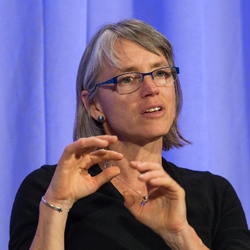
About
Nancy Kanwisher is the Walter A. Rosenblith Professor of Cognitive Neuroscience in the Department of Brain & Cognitive Sciences at MIT, and Investigator at MIT’s McGovern Institute for Brain Research. She received her B.S. in 1980 and her PhD in 1986, both from MIT. After receiving her Ph.D., Kanwisher held a MacArthur Fellowship in Peace and International Security for two years. Kanwisher then served as a faculty member for several years each in the UCLA and Harvard Psychology departments, before returning to MIT in 1997. Kanwisher's lab has contributed to the identification and characterization of a number of regions in the human brain that conduct very specific cognitive functions, including four that are involved in the visual perception of specific kinds of stimuli (faces, places, bodies, and words). Kanwisher received a Troland Research Award from the National Academy of Sciences in 1999, a MacVicar Faculty Fellow teaching Award from MIT in 2002, the Carvalho-Heineken Prize in Cognitive Science in 2018, the Kavli Prize in Neuroscience in 2024, and the António Champalimaud Vision Award in2025. She was elected as a member of the National Academy of Sciences in 2005 and the American Academy of Arts and Sciences in 2009.
You can view the lectures from her undergraduate course The Human Brain here.
Research
Our lab investigates the functional organization of the brain as a window into the architecture of the human mind. In the past our lab has contributed to the identification and characterization of a number of regions in the human brain that conduct very specific functions, including four that are involved in the visual perception of specific kinds of stimuli (faces, places, bodies, and words), and other regions specialized for language (a collaboration with Fedorenko), understanding other minds (with Saxe), and music (with McDermott). Current work is exploring the functional organization and computations conducted in regions of the parietal and frontal cortices implicated in intuitive physics, and regions of the superior temporal sulcus implicated in high-level social perception. Many recent lines of work use artificial neural networks as computational models of human vision and as test beds for understanding which inductive biases are necessary for humanlike behavior and neural organization to arise. More broadly, we seek to understand the representations, computations, connectivity, cytoarchitecture, development, and evolution of functionally distinctive cortical regions, as well as the interactions among them and their possible alterations in clinical disorders.
Teaching
Kanwisher’s main undergraduate course is 9.13 The Human Brain; lectures form the 2019 version are available here.
Publications
A list of publications can be found on the Kanwisher lab website.

